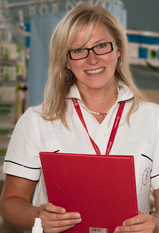- Departments and Clinics
- Clinic of Surgery 1st Faculty of Medicine Charles University and Thomayer University Hospital
Clinic of Surgery 1st Faculty of Medicine Charles University and Thomayer University Hospital
Characteristics
The department provides care to outpatients and inpatients with conditions requiring surgery. Besides, the department serves as a „super-consultancy“ body for patients requiring lung, biliary tract, pancreas and alimentary canal surgery from all over the country. Patients with breast disease and injuries to the locomotor tract make up a major proportion of those treated in our department.
Surgery is performed both conventionally (open access) and as mini-invasive procedures (laparoscopy and thoracoscopy).
The Department of Surgery is involved both in undergraduate (Charles University medical students) and postgraduate (physicians preparing for board examinations) training related particularly to treatment of malignancies. The department is an accredited center for oncosurgery. While patients hospitalized in the Department of Surgery commonly get involved in hands-on training, their involvement is voluntary and their refusal to participate in the training programs does not imply any restriction in terms of access to health care or other rights of the patient.
Depending of the range of care provided, the Department of Surgery is divided into three centers:
- Department of General Surgery (G3 building);
- Department of Thoracic Surgery (B1 building);
- Department of Traumatology (G3 building).
Characteristics of the Department of General Surgery
The Division of General Surgery provides care both to patients with non-malignancies such as hernias, benign gallbaldder diseases, inflammatory bowel disease, and those with malignancies. A major surgical (not only therapeutic but, also, training) program is that in oncosurgery, i.e., surgical management of malignant tumors involving primarily the alimentary canal (esophagus, stomach, small and large bowels, and anus) but, also, other types of tumors involving other organs of the digestive system (liver, pancreas, gallbladder, and biliary tract). Our department has also long been involved in the treatment of advanced malignant tumors, their recurrence (return of symptoms after therapy) as well as treatment of metastasizing tumors.
Patients diagnosed to have a malignancy or severe benign disease are indicated to therapy selected on the basis of an interdisciplinary indication seminar.
Referred patients receiving treatment in the department are not only residents within the catchment area of Thomayer University Hospital; they also come from other regions of the country, particularly if they have been diagnosed to have advanced or otherwise complicated malignancies.
General outpatient clinic
Emergencies (emergency outpatient examinations and treatment of injuries to the locomotor system, sudden-onset abdominal pain, major bleeding, etc.) are managed in the general outpatient clinic in the working hours (Monday to Friday at 07:00–15:00) upon referral by the general practitioner or specialist, or the patients are brought in by Emergency Medical Service vehicles. Outside the emergency working hours (Monday to Friday 15:00-07:00, weekends and holidays), emergencies (patients) are referred by first-aid medical service, brought in by EMS vehicles or, in exceptional cases, present without previous referral.
To discuss a scheduled surgical procedure, and to finalize their appointment, the patient presents either at the general outpatient department (Monday to Friday 08:00–15:00) or directly at one of the specialist clinics (see information below).
Specialist counseling centers
Provide care to patients with individual types of malignant and benign conditions. Those presenting there are either referred by their general practitioner, outpatient specialist, or is referred by another clinic or department of Thomayer Hospital. The patient will receive, from their referring physician, their medical records including a written summary of the course of their disease and any diagnostic and/or therapeutic procedures. An integral part of a patient´s medical records including those made using imaging techniques – x-ray, computed tomography (CT), magnetic resonance imaging (MRI), endoscopic retrograde cholangiopancreaticography (ERCP) in electronic format. Results of examinations made using imaging techniques can also be accessed via the E-PACS system. When needed, any additional examinations can be performed within Thomayer Hospital.
The department´s surgical ward provides care to patients admitted for emergency medical conditions or those hospitalized for elective surgery.
The general surgical clinic of the Department of Surgery operates three standard-care wards and one intensive care unit.
Patients with less severe conditions may also receive also in short-term hospitalization programs their overall status and postoperative course permitting. Those not requiring intensive care may choose hospitalization in single- or double-bed premium care rooms.
Also available, as part of in-hospital care in the department, are rehabilitation programs, with rehabilitation exercise performed under the supervision of specifically trained staff.
Additionally, hospitalized patients may wish to discuss non-medical issues with a clergyman who will visit anybody potentially interested in such a service in the Department of Surgery upon request.
Appointments can be made at phone number:
+420 261 082 607

Head of the Clinic
Jaromír Šimša, MD, PhD.
Associate Professor
jaromir.simsa@ftn.cz
+420 261 082 600

Chief of Physicians
Marek Mráček, MD
marek.mracek@ftn.cz
+420 261 083 301

Head Nurse
PhDr. Lenka Trubačová
lenka.trubacova@ftn.cz
+420 261 082 601
Contact for
English-speaking guests
jaromir.simsa@ftn.cz
+420 261 082 600
Location
building G3 and B1
